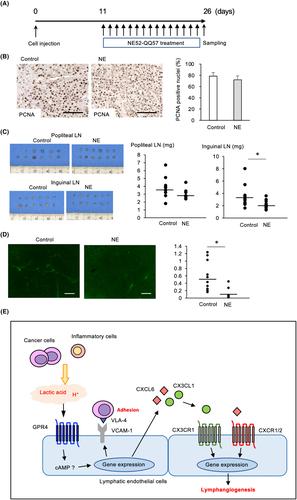当前位置:
X-MOL 学术
›
Cancer Sci.
›
论文详情
Our official English website, www.x-mol.net, welcomes your
feedback! (Note: you will need to create a separate account there.)
Acid-sensing receptor GPR4 plays a crucial role in lymphatic cancer metastasis
Cancer Science ( IF 4.5 ) Pub Date : 2024-02-27 , DOI: 10.1111/cas.16098 Masako Nakanishi 1 , Akiya Ibe 1 , Kiyoto Morishita 1 , Kazutaka Shinagawa 1 , Yushi Yamamoto 1 , Hibiki Takahashi 1 , Kyoka Ikemori 1 , Yasuteru Muragaki 1 , Shogo Ehata 1
Cancer Science ( IF 4.5 ) Pub Date : 2024-02-27 , DOI: 10.1111/cas.16098 Masako Nakanishi 1 , Akiya Ibe 1 , Kiyoto Morishita 1 , Kazutaka Shinagawa 1 , Yushi Yamamoto 1 , Hibiki Takahashi 1 , Kyoka Ikemori 1 , Yasuteru Muragaki 1 , Shogo Ehata 1
Affiliation

|
Cancer tissues exhibit an acidic microenvironment owing to the accumulation of protons and lactic acid produced by cancer and inflammatory cells. To examine the role of an acidic microenvironment in lymphatic cancer metastasis, gene expression profiling was conducted using human dermal lymphatic endothelial cells (HDLECs) treated with a low pH medium. Microarray and gene set enrichment analysis revealed that acid treatment induced the expression of inflammation-related genes in HDLECs, including genes encoding chemokines and adhesion molecules. Acid treatment-induced chemokines C-X3-C motif chemokine ligand 1 (CX3CL1) and C-X-C motif chemokine ligand 6 (CXCL6) autocrinally promoted the growth and tube formation of HDLECs. The expression of vascular cell adhesion molecule 1 (VCAM-1) increased in HDLECs after acid treatment in a time-dependent manner, which, in turn, enhanced their adhesion to melanoma cells. Among various acid-sensing receptors, HDLECs basally expressed G protein-coupled receptor 4 (GPR4), which was augmented under the acidic microenvironment. The induction of chemokines or VCAM-1 under acidic conditions was attenuated by GPR4 knockdown in HDLECs. In addition, lymph node metastases in a mouse melanoma model were suppressed by administering an anti-VCAM-1 antibody or a GPR4 antagonist. These results suggest that an acidic microenvironment modifies the function of lymphatic endothelial cells via GPR4, thereby promoting lymphatic cancer metastasis. Acid-sensing receptors and their downstream molecules might serve as preventive or therapeutic targets in cancer.
中文翻译:

酸敏感受体GPR4在淋巴癌转移中发挥关键作用
由于癌症和炎症细胞产生的质子和乳酸的积累,癌症组织呈现出酸性微环境。为了研究酸性微环境在淋巴癌转移中的作用,使用低 pH 介质处理的人真皮淋巴内皮细胞 (HDLEC) 进行基因表达谱分析。微阵列和基因集富集分析表明,酸处理诱导 HDLEC 中炎症相关基因的表达,包括编码趋化因子和粘附分子的基因。酸处理诱导的趋化因子 C-X3-C 基序趋化因子配体 1 (CX3CL1) 和 CXC 基序趋化因子配体 6 (CXCL6) 自分泌促进 HDLEC 的生长和管形成。酸处理后,HDLEC 中血管细胞粘附分子 1 (VCAM-1) 的表达以时间依赖性方式增加,这反过来又增强了它们对黑色素瘤细胞的粘附。在各种酸敏感受体中,HDLEC 基础表达 G 蛋白偶联受体 4 (GPR4),在酸性微环境下表达增强。 HDLEC 中GPR4敲低可减弱酸性条件下趋化因子或 VCAM-1 的诱导。此外,通过施用抗VCAM-1抗体或GPR4拮抗剂抑制了小鼠黑色素瘤模型中的淋巴结转移。这些结果表明酸性微环境通过GPR4改变淋巴管内皮细胞的功能,从而促进淋巴癌转移。酸敏感受体及其下游分子可能作为癌症的预防或治疗靶点。
更新日期:2024-02-27
中文翻译:

酸敏感受体GPR4在淋巴癌转移中发挥关键作用
由于癌症和炎症细胞产生的质子和乳酸的积累,癌症组织呈现出酸性微环境。为了研究酸性微环境在淋巴癌转移中的作用,使用低 pH 介质处理的人真皮淋巴内皮细胞 (HDLEC) 进行基因表达谱分析。微阵列和基因集富集分析表明,酸处理诱导 HDLEC 中炎症相关基因的表达,包括编码趋化因子和粘附分子的基因。酸处理诱导的趋化因子 C-X3-C 基序趋化因子配体 1 (CX3CL1) 和 CXC 基序趋化因子配体 6 (CXCL6) 自分泌促进 HDLEC 的生长和管形成。酸处理后,HDLEC 中血管细胞粘附分子 1 (VCAM-1) 的表达以时间依赖性方式增加,这反过来又增强了它们对黑色素瘤细胞的粘附。在各种酸敏感受体中,HDLEC 基础表达 G 蛋白偶联受体 4 (GPR4),在酸性微环境下表达增强。 HDLEC 中GPR4敲低可减弱酸性条件下趋化因子或 VCAM-1 的诱导。此外,通过施用抗VCAM-1抗体或GPR4拮抗剂抑制了小鼠黑色素瘤模型中的淋巴结转移。这些结果表明酸性微环境通过GPR4改变淋巴管内皮细胞的功能,从而促进淋巴癌转移。酸敏感受体及其下游分子可能作为癌症的预防或治疗靶点。











































 京公网安备 11010802027423号
京公网安备 11010802027423号